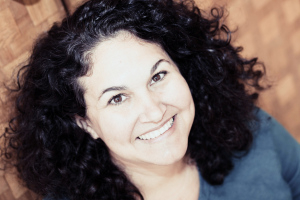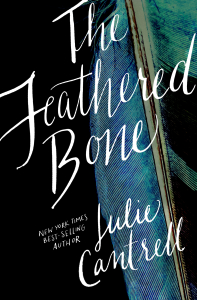
Julie Cantrell is the New York Times and USA Today bestselling author of Into the Free, a debut novel that earned both a Christy Book of the Year and the Mississippi Library Association’s Fiction Award. Its sequel, When Mountains Move, was named a Best Read by LifeWay, was shortlisted for several awards, and won the 2014 ACFW Carol Award for Historical Fiction.
Julie is a columnist for the Huffington Post, has served as editor-in-chief of the Southern Literary Review, and is the recipient of the Mississippi Arts Commission Literary Fellowship. She is also a certified speech-language pathologist in the public schools of Oxford, Mississippi.
She and her family reside in the Oxford area.
 Your third novel, The Feathered Bone, was released in January (HarperCollins). In it, you address several difficult issues. What did you learn by writing about such topics?
Your third novel, The Feathered Bone, was released in January (HarperCollins). In it, you address several difficult issues. What did you learn by writing about such topics?
I learned the importance of talking openly about issues like human trafficking, teen suicide, and domestic violence. It’s true, they are difficult to examine. It’s not pretty stuff. But by ignoring the reality of what is happening around us, we are — in a sense — allowing it to happen.
It’s time we examine the impact our choices have on others, particularly how our choices affect the most vulnerable among us. We tend to convince ourselves that when we act as a group (a business, a political party, a government, a society, etc.) we are not personally responsible for those actions. We remove our own accountability. We convince ourselves we can’t change things because we use terms like they and them instead of we and us.
It’s an intriguing title for a book. What does it reference?
While brainstorming the story, my publisher and I were discussing the various ways women can become enslaved in life. Research led us to an article about featherbone corsets. It’s a fascinating story that is woven into the book.
To sum it up, corsets were once made of very rigid materials like steel rods, wooden reeds, and whalebones. But this restrained women’s movement too much, and they frequently broke. In 1883, a savvy Michigan businessman discovered a feather-duster factory in Chicago. He decided to use discarded featherbones to make corsets. These were less costly than the traditional steels, and they allowed women to bend without the bindings breaking.
In the book, the featherbone represents the resilient strength of something that can bend without breaking, and the corsets are used to examine the lengths women will reach in order to feel of worth to a man. Throughout history, we have allowed ourselves to become “slaves” in a sense. We go as far as contorting our bodies and worse, our minds. We bind our feet and train our waists; we have facelifts and breast implants and develop eating disorders. We dye our hair and spend excessive amounts of money on clothing and jewelry and make-up. And worst of all, we absorb lies about our true purpose in life — all so men will consider us worthy of their attention and affection.
I realize this can affect both men and women, but culturally, women are usually the ones taking such extreme steps. As a woman, I want everyone, men and women both, to believe we are of worth exactly as God created us, without having to lose our true selves in order to gain human acceptance.
How does your personal faith impact your worldview?
As a person of faith, I believe we are loved, each and every one of us. But as life hurts us, we begin to believe a very big lie — that we are not loved. This either hardens us or makes us desperately seek love from unhealthy sources, leading us to hurt ourselves and others.
If we have a solid belief that we are loved by God, we are free. We are only separated from this love by our own choices or our own reactions to the choices of others. Realizing this and opening ourselves once again to God’s love is the essence of what some people call a spiritual awakening, enlightenment, or (in Christian terms) being born again (or saved).
[ctt title=”If we have a solid belief that we are loved by God, we are free.” tweet=”If we have a solid belief that we are loved by God, we are free. @JulieCantrell @ThomasNelson http://ctt.ec/d632U+” coverup=”d632U”]I have explored this a bit in all three of my novels. In The Feathered Bone, Sarah, goes through horrific experiences when she is kidnapped and trafficked. But she is able to journal her way through the captivity by examining the lies the captor wants her to believe versus the truth she knows in her heart. She comes very close to separating herself from the truth, from God’s love for her, but in the end, she holds tightly to the core beliefs her parents instilled in her and that’s how she is able to fight her way back to freedom and to the light.
For more information about Julie and The Feathered Bone, visit her website or follow her on Facebook, Twitter, Pinterest or Goodreads.
To purchase The Feathered Bone, log on to:
Julie, your words definitely resonate with me. I appreciate you writing a novel with this theme and now I want to read it! For years I swallowed lies about my own self worth and you’re right, it wasn’t until I accepted that God loves me–and that’s the only thing that counts–did my life turn around for the better.
Thanks, Kathy, for a great interview.